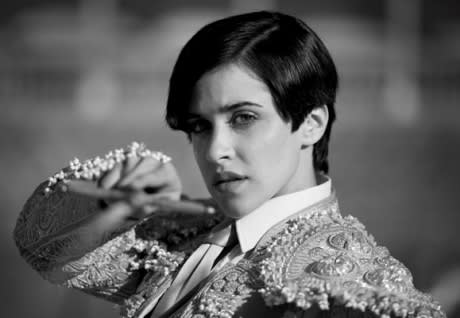In theory, investigating the evolution of cinematic grammar through the regressive recreation of a silent film should conceivably act as a discourse about the nature of storytelling and cultural evolution. Chipping away at the conventions, tropes, technological advancements and techniques throughout the decades can expose social prioritization through the ages, deconstructing our tendency towards mass assimilation and assessing instigators for change.
But much like The Artist, Pablo Berger's Blancanieves (a variation on the Snow White mythology, as filtered through a 1920s Spanish bullfighting milieu) is more of a gimmicky ode to nostalgia than a thought-provoking work. It relies on a whimsical black and white aesthetic and perpetual, emotionally guiding score to merely simplify narrative conventions to a base common denominator, championing all things antiquated, whether filmmaking, fairy tales or the slaughtering of bulls for populist entertainment.
Oddly, or ironically, its major issue is that of constructing its world without a framework of modern storytelling techniques. It takes nearly half the movie for the setup to come to fruition, having to detail the goring of a famed bullfighter and the upbringing of his daughter by her benevolent grandmother, until a heart attack leaves her in the care of a wicked stepmother. Once in the custody of Encarnu (Maribel Vernú), the nurse that wooed her now quadriplegic father, where Carmencita (Macarena García/Sofia Oria) is relegated to a life of manual labour, condemned from seeing her dad, the Snow White framework comes into play.
Though Blancanieves has the structure of a silent film, Berger employs an abundance of modern camerawork to tell the story, often breaking the 180-degree rule and employing editing and montage techniques far beyond the '20s template utilized. Still, despite ostensibly cheating, or, as some might say, "subverting" the rules, he has a hard time establishing this world and these characters until our familiarity comes into play, recognizing the basic tenets of the Grimm Brothers' story.
With the vulgarity of bullfighting guiding the trajectory — Carmencita eventually learns the art from her father, going on to be a success in the field — Berger could have pointed out that out-dated film techniques are now as garish as crass modes of entertainment. But Berger is championing these histories, romanticizing the past with the same single-minded vision that ultimately renders his film emotionally hollow.
During the final moments, he injects a bit of ambiguity and intrigue into the template, rendering the fantastical aspects of our expectations irrelevant, which gives the impression of the text having more to it than it really does. Had more of this glossy work of artifice been conscious of its storytelling decisions, Berger's work could have inspired discourse in the absence of emotional connection.
Despite these shortcomings, Blancanieves is still far more thoughtful and compelling than the embarrassment that was The Artist.
(D Films)But much like The Artist, Pablo Berger's Blancanieves (a variation on the Snow White mythology, as filtered through a 1920s Spanish bullfighting milieu) is more of a gimmicky ode to nostalgia than a thought-provoking work. It relies on a whimsical black and white aesthetic and perpetual, emotionally guiding score to merely simplify narrative conventions to a base common denominator, championing all things antiquated, whether filmmaking, fairy tales or the slaughtering of bulls for populist entertainment.
Oddly, or ironically, its major issue is that of constructing its world without a framework of modern storytelling techniques. It takes nearly half the movie for the setup to come to fruition, having to detail the goring of a famed bullfighter and the upbringing of his daughter by her benevolent grandmother, until a heart attack leaves her in the care of a wicked stepmother. Once in the custody of Encarnu (Maribel Vernú), the nurse that wooed her now quadriplegic father, where Carmencita (Macarena García/Sofia Oria) is relegated to a life of manual labour, condemned from seeing her dad, the Snow White framework comes into play.
Though Blancanieves has the structure of a silent film, Berger employs an abundance of modern camerawork to tell the story, often breaking the 180-degree rule and employing editing and montage techniques far beyond the '20s template utilized. Still, despite ostensibly cheating, or, as some might say, "subverting" the rules, he has a hard time establishing this world and these characters until our familiarity comes into play, recognizing the basic tenets of the Grimm Brothers' story.
With the vulgarity of bullfighting guiding the trajectory — Carmencita eventually learns the art from her father, going on to be a success in the field — Berger could have pointed out that out-dated film techniques are now as garish as crass modes of entertainment. But Berger is championing these histories, romanticizing the past with the same single-minded vision that ultimately renders his film emotionally hollow.
During the final moments, he injects a bit of ambiguity and intrigue into the template, rendering the fantastical aspects of our expectations irrelevant, which gives the impression of the text having more to it than it really does. Had more of this glossy work of artifice been conscious of its storytelling decisions, Berger's work could have inspired discourse in the absence of emotional connection.
Despite these shortcomings, Blancanieves is still far more thoughtful and compelling than the embarrassment that was The Artist.
